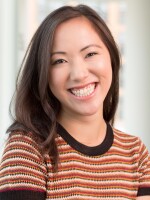ROBERT SIEGEL, HOST:
Brown is a word that is sometimes used to describe people who are not white, including some people who also identify as Asian-American. NPR's Code Switch team recently got a question from a listener. Should light-skinned Asian-Americans like some East Asians be able to call themselves brown? Kat Chow of Code Switch says the answer is complicated.
KAT CHOW, BYLINE: People call themselves brown for a number of reasons.
COOKIE EVERMAN: I am Filipina and call myself brown because my skin is brown.
SHALINI ROSE: I'm half-Indian and half-Filipino. I just always considered myself in the middle of black and white. And to me, logically, as a kid, that was brown.
MALLIKA RAO: I remember in junior high school looking around my group of friends. All of our parents had come from a different country. I think we were, like, you know, quote, unquote, "brown."
CHOW: Those are the voices of Cookie Everman, Shalini Rose and Mallika Rao. Rao is a writer who grew up in Texas. Her parents are from India. She says brown is a sort of amorphous word, tough for her to describe. But it means something other than white.
RAO: It's sort of this negative space idea, like, when you have sort of a shared sense of oppression
CHOW: But that oppression Rao is talking about varies for different Asian ethnicities. Research shows that the types of discrimination that East Asians report in the U.S. is generally much different than what South or Southeast Asians report. Karthick Ramakrishnan is a dean at the University of California, Riverside.
KARTHICK RAMAKRISHNAN: Today, for example, I flew to Oakland. And I was pulled aside, maybe randomly, maybe not.
CHOW: Ramakrishnan is Indian-American. He heads the National Asian American Survey, one of the few efforts to break out research of Asian Americans by country of origin.
RAMAKRISHNAN: And I would imagine that that's more likely to happen to brown Asians than to East Asians.
CHOW: And research supports similar discrepancies. NPR, the Robert Wood Johnson Foundation and the Harvard T.H. Chan School of Public Health surveyed Asian Americans about discrimination. Indian-Americans reported unfair treatment or stops by police eight times more often than Chinese-Americans.
In his own research, Ramakrishnan also found discrepancies in how South and East Asian-Americans view hiring practices. Twenty-one percent of Indian-Americans say they were unfairly not hired because of their ethnicity compared to 14 percent of Chinese-Americans, which brings us back to that idea of shared oppression and how people draw lines around themselves.
RAMAKRISHNAN: What we find in our survey interviews is that a significant chunk of Americans, including a significant chunk of Asian-Americans, do not consider Indians and Pakistanis to be Asian.
CHOW: Ramakrishnan says that has political consequences.
RAMAKRISHNAN: When it comes to the murder of South Asians, you don't see as broad of an Asian-American mobilization.
CHOW: Ramakrishnan points to the death earlier this year of a man named Srinivas Kutchibhotla. Kutchibhotla was Indian-American. He was shot and killed in a Kansas bar by a white man who yelled, get out of my country. Ramakrishnan says Kutchibhotla's death outraged South Asians, but it felt like there was an absence of other loud Asian-American voices. That reality is why some Korean, Japanese and Chinese-Americans want to be careful with identifying as brown.
MICHELLE LEE: I identify as Korean-American. I do not identify as brown.
CAITLIN TRAN: I don't call myself brown because I know my experience is different, and I wouldn't want to co-opt it.
JEENIE YOON: And I don't want to diminish the experiences of those who I do identify as brown by looping myself in with that identity.
CHOW: Those are the voices of Michelle Lee, Caitlin Tran and Jeenie Yoon. Yoon is Korean-American. She says that often she feels that she and other East Asians are overlooked in conversations about race. Sometimes it seems like people only talk about black or white. She recalls a conversation she once had with a friend.
YOON: I was telling some random story. And I was - I said, like, yeah, like, as a person of color, it was really annoying. And she kind of, like, quirked her eyebrow at me and looked at me and was like, oh, you identify as a person of color?
CHOW: Yoon might not call herself brown, but she says she's not white. She's definitely a person of color. And that phrasing she feels comfortable with. Kat Chow, NPR News.
(SOUNDBITE OF SHARON JONES AND THE DAP-KINGS SONG, "WINDOW SHOPPING") Transcript provided by NPR, Copyright NPR.




